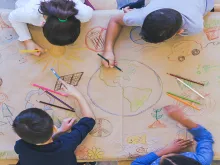Sara Hamano was initially assigned in 2018 to the United Nations Resident Coordinator's Office in Belgrade, Serbia, as a UN Volunteer Development Assistant Associate. She later moved to the Environment Unit of the UN Development Programme (UNDP), with a mandate to tackle low awareness of environmental sustainability among industry and consumers in Serbia. Two years on, she shares her experience.
As a coordinating agency, the RCO seeks to strengthen cooperation between UN entities on issues related to economic development and climate change resilience. It looks at ways to strengthen the UN system by financing and implementing cross-cutting programmes.
The UNDP Circular Economy project was developed to encourage the principles of the 3Rs – Reduce, Reuse, Recycle. In the European Union, new laws based on the Circular Economy strategy have been introduced to tackle plastic packaging and consumption of raw materials.
To prepare for entry to the European Union, Serbia has been encouraged to improve its legislation on the environment. The country has low capacity to manage waste and pollution in the air and water reserves and has traditionally relied on unclean energy sources, compounded by insufficient waste management practices. Against this background, UNDP has sought to encourage new business models that change "business as usual" in terms of resource consumption and waste generation in the areas of plastics, food waste and textiles, all of which have a close connection to consumer behaviour.
Sara served through the Global Human Resource Development Programme for Peacebuilding and Development (HRD) of the Government of Japan from March 2018 for one year.
She was tasked with researching best-practice models that exemplify the principles of the circular economy. She attended conferences that kept her informed on the latest developments in the fields of the green and circular economy and sustainable financing, which she was able to feed back to her host agency and build into her assignment.
"I conceptualized an innovation challenge programme based on the circular economy principles, which specified 10 small and medium-size enterprises and entrepreneurs as beneficiaries. I defined the type of technical assistance and support required and identified possible mentors for the project," Sara shares
The circular economy project encouraged change on both sides of consumption and production. It allowed industry to scale innovative business models, such as sharing of goods and non-plastic packaging. Also, the project increased awareness among consumers, inspiring them to change their behaviour towards buying products that generate less waste and encouraged everyday actions that make a difference. --Sara Hamano, UN Volunteer Development Assistance Associate with UNDP, Serbia
Sara gained understanding of the importance of partnerships in achieving the Sustainable Development Goals. "The UN system is a close partner of the national government and they work together on development goals. The success of a programme and project involves partnerships, sharing of local knowledge and identifying who is the best partner to achieve specific objectives and influence positive outcomes," says Sara.
Working with UNDP was very exciting. UNDP has been transforming innovative ideas – such as the circular economy, blockchain financing and private sector partnerships – into actions, as it works to improve environmental outcomes. --Sara Hamano
Sara’s assignment contributed to SDG12 – Ensure sustainable consumption and production patterns.

